Exclusive: 'Ready to stomp on it': Documents reveal staggering power of tech giant lobbying
Executives at tech giants like Facebook (FB), Google (GOOG, GOOGL), Amazon (AMZN), and Apple (AAPL) say they want a nationwide law that protects user data. But at the state level, the actions of the companies tell a different story.
A Yahoo Finance investigation reveals a lobbying campaign on behalf of Big Tech to stop data privacy bills this year in at least 13 states.
“The tech companies have enormous resources,” Anthony Nownes, a political science professor at the University of Tennessee and author of “Total Lobbying: What Lobbyists Want (and How They Try to Get It),” told Yahoo Finance.
“They can deploy a lobbyist anytime, anywhere. There’s no privacy advocacy group that has the resources that Google has,” Nownes added. “Legislators know who’s showing up to tell them to do something: The tech companies.”
‘Lobbyists came in full bore to stomp on it’
To hear the tech companies and trade groups tell it, the lobbying is no contradiction: A federal law would allow easier compliance and more consistent user protections than a state measure. Privacy advocates and some state lawmakers, however, question the sincerity of the tech giants’ push for national regulation, calling it an effort to undermine the robust European Union-style law passed in California and other potential state measures.
Democratic presidential candidates, most notably Massachusetts Senator Elizabeth Warren, have criticized the companies for “throwing around their political power to shape the rules in their favor.”
Yahoo Finance examined state lobbying records and committee hearing transcripts in addition to speaking with 15 state lawmakers to detail an advocacy campaign on the part of Big Tech that influenced statehouses nationwide.
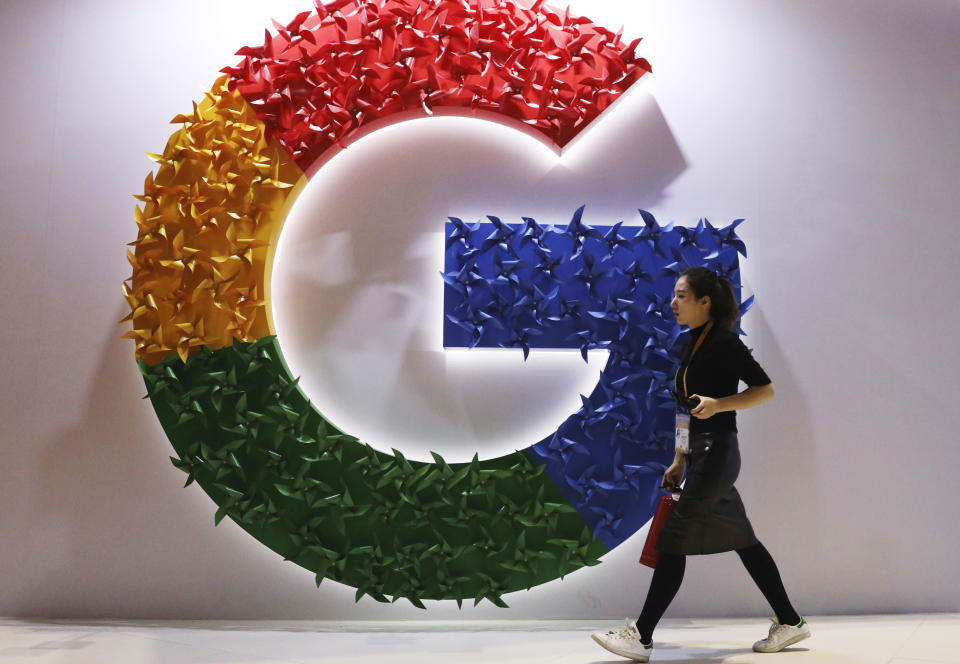
After California passed its law last June, bills protecting user information were proposed this year in about half of U.S. states. The largest tech companies, or trade groups lobbying on their behalf, fought against the measures in most states. Nearly every bill has failed to pass.
Only two states have enacted such laws this year: Nevada and Maine. In Nevada, the bill succeeded after an amendment presented by an industry trade group that represents large tech firms. In Maine, trade groups initially opposed the bill but came around to support the measure.
In March, a Texas bill modeled after the California law prompted opposition from lobbyists advocating on behalf of tech companies. The legislature soon discarded the measure in favor of one that called for a study on the issue. The same pattern — an initial data privacy bill replaced with a study — took place in Connecticut and North Dakota, both after advocacy from tech industry lobbyists.
Washington State mulled a privacy bill that overwhelmingly passed the Senate but died in the House in April after tech industry negotiations that included 10 hours of meetings between the governor’s office, legislators, and lobbyists from Amazon, Microsoft (MSFT), and others. Some big tech companies supported the Senate version but many opposed the House version, said Sen. Reuven Carlyle, the bill’s primary sponsor in the Senate.
“It was heavily lobbied — the tech folks really did lean in,” Democratic Washington State Rep. Zack Hudgins, one of a group of state lawmakers focused on cybersecurity with the National Conference of State Legislators, said of his state’s privacy measure. Rep. Jim Kasper, a Republican assemblyman in North Dakota, said of a data bill he introduced in January: “Lobbyists came in full bore ready to stomp on it.”
‘The more data they have, the more valuable it is to them’
The bill introduced in Washington State, like the law passed in California and the European Union’s General Data Protection Regulation, guaranteed users the right to know the data a company has obtained and to request it be deleted. Many of the bills proposed in other states were also modeled after California’s, while others were less robust or applied to fewer companies.
“The more data they have, the more valuable it is to them,” Rep. Jonathan Carroll, an Illinois Democrat who supported his state’s data bill, said of the large tech companies. “Of course they’re going to fight us.”
While tech companies and some tech trade groups ultimately came to support bills in Nevada and Maine, they fought against measures in at least 13 of the some 25 states in which they were introduced this year. In the remaining states, several of the bills did not reach a committee hearing, which is the point at which lobbyist opposition often can be found on publicly available records.
The tech companies defended their state-level advocacy, saying they want far-reaching and uniform privacy protections.
“We understand the frustration at the state level — we are frustrated too — but this topic is so important we need to be united across America,” Apple told Yahoo Finance.
“Our work in states around the country demonstrates that as a company we are making a concerted effort to engage policymakers and privacy experts on the right approach to create consistent rules around privacy,” Facebook Vice President of State and Local Public Policy Will Castleberry said.
A Google spokesperson referred Yahoo Finance to a page on the company’s website, which says, “We champion public policy and regulatory approaches that ensure the internet continues to be a vehicle of growth and innovation serving the widest range of people possible.”
An Amazon spokesperson, meanwhile, said, “Customer trust is our highest priority, and we know we must get privacy right in order to meet our customers’ high expectations. If customers do not trust us with their data, they will stop using our services.”
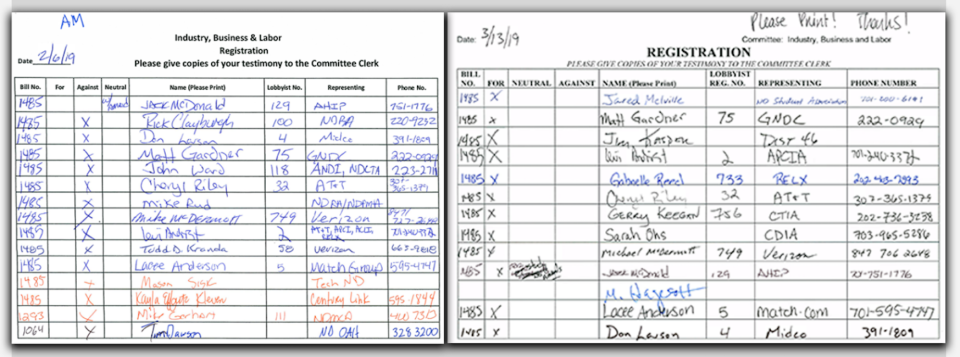
Lobbyist acknowledges the ‘need to collect’ user data
As gridlock in Congress has worsened, state legislatures have taken on greater significance as wellsprings of new law, said Mark Schmitt, director of the Political Reform program at the think tank New America. “They can have a huge impact,” he said.
Lobbyists adapted in turn: Between 2010 and 2016, the number of interest groups — companies, trade groups, unions, and others — with hired or part-time lobbyists grew by more than 10%, according to a study by the Center for Public Integrity. Apple, Facebook, Google, and Amazon each currently has a lobbyist registered in more than 30 states.
Records show the tech giants lobbying on data privacy bills directly on their own behalf, such as an Amazon-hired lobbyist who opposed a bill in Illinois or another, advocating for Google, who testified in support of a bill in Nevada after an amendment presented by the State Privacy and Security Coalition, an industry trade group the company belongs to.
It’s important to note that much of the lobbying on behalf of the tech giants has been done by trade groups the companies belong to as paying members. Those trade groups include a number of Washington, D.C.-based firms like the Internet Association and the Cellular Telecommunications and Internet Association, or CTIA — each of which operates on a yearly budget in the millions, buoyed by membership dues from client companies, 990 forms show.
Lobbyists for the trade groups traveled from across states to testify against privacy bills in committee hearings and held meetings with legislators.
Representatives from TechNet — whose member companies include Google, Facebook, Amazon, and Apple — testified against privacy bills in at least seven different states this year. The State Privacy and Security Coalition, which represents Apple and Google, also did so in at least seven states. And CTIA — working on behalf of each of the big four except Facebook — did so in at least six states.
Andrew Kingman, a lobbyist with the State Privacy and Security Coalition, gave either written or spoken testimony against a different data privacy bill in five consecutive months. Meanwhile, lobbyist Gerard Keegan of CTIA did the same for four different data privacy bills over a seven-week span, traveling to statehouses in North Dakota, Montana, and Maryland. At an Assembly committee hearing in North Dakota, in February, Keegan said user data “is valuable to a business” so his client companies “need to collect it.”

‘Money has an effect on access’
In addition to addressing legislators at hearings, lobbyists held conversations with bill sponsors and members of relevant committees. Rep. Hudgins, of Washington State, compiled a list of over 40 industry representatives he was in contact with about a data privacy bill in his state.
In North Dakota, bill sponsor Rep. Kasper called the lobbyists’ strategy “carefully orchestrated,” describing conversations between lobbyists and committee members “behind the scenes.” Rep. Trey Martinez Fischer, the primary backer of a data privacy bill in Texas, said he was contacted by “every single member of industry from Texas businesses to digital operations in Silicon Valley.”
In Washington State and Illinois, two of the most important states that introduced data privacy bills this year, tech giants made campaign contributions to key legislators in the months leading up to the introduction of a privacy bill.
Last October, Facebook gave $1,000 to the campaign of Illinois Rep. Jonathan Carroll, a sponsor of the data bill introduced the following February. In Washington State, the company made donations of $1,000 each to the campaigns of Sen. Reuven Carlyle and Rep. Hudgins — both chairs of committees that took up a data privacy bill a few months later. In the last three months of 2018, Hudgins received $500 from Amazon and $1,000 from Microsoft, while Carlyle received $1,000 each from Verizon (VZ) and AT&T (T).
(Yahoo and Verizon, Yahoo Finance’s parent company, declined to comment for this story.)
“I wouldn’t make anything of it,” Hudgins said of the donations. “We don’t have enough people that can talk tech and sell technology to caucuses — that’s why industry supports people like Reuven and I.” Defending the contribution from Facebook, Caroll said, “If I’m not comfortable accepting a donation, I won’t. They put no pressure on me either way.”
Amazon denied having sought influence or access with its donation to Hudgins. Nownes, the political science professor at the University of Tennessee, argued that these sorts of donations will help the companies’ causes.
“Money has an effect on access,” he said. “It’s not necessarily about the money influencing legislators. It’s about giving companies entree into a legislator’s office.”
On top of seeking access to state legislators’ offices, tech companies invited legislators to visit theirs. In June 2014, the companies sponsored Hudgins’ trip to Silicon Valley for a three-day visit to the campuses of Facebook, Google, and Yahoo, he said. Between 20 and 30 state legislators attended, according to Hudgins. An itinerary obtained by Yahoo Finance lists activities such as a “Google Glass demonstration” and “Internet Policy Panels with Facebook, Google, and Yahoo!” Dinner receptions were held at the end of days spent at the Facebook and Google campuses, the itinerary says.
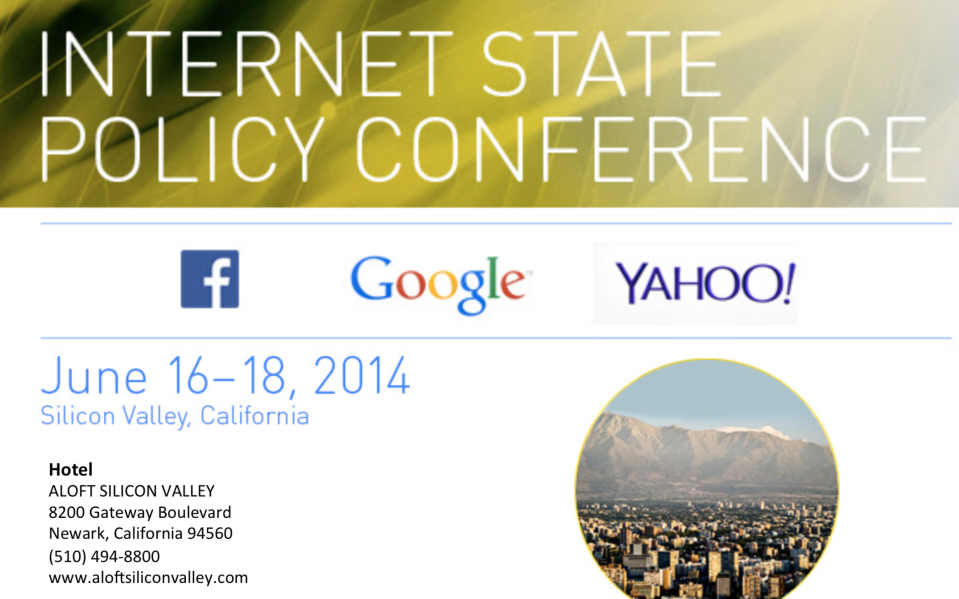
Trade groups enable ‘lobbying over, over, and over again’
Drawing on the companies’ membership dues, tech industry trade groups can amass assets in the tens or hundreds of millions. For instance, CTIA in 2017 boasted total assets worth $186.6 million, according to a 990 form, including $11.4 million in annual revenue generated by membership dues. That year, the Internet Association — whose members include Amazon, Google, and Facebook — netted $6.2 million in dues.
“Paradoxically, the tech companies are spending enormous amounts of money and yet those enormous amounts of money are a tiny, tiny fraction of the resources they have,” Nownes said.
Each of the four biggest tech companies belong to multiple trade groups. On its website, Google lists 94 trade associations and membership groups it belongs to; Apple lists 39.
“If businesses have lobbyists and belong to 10 trade associations,” Nownes said. “Then they’re lobbying over, over, and over again.” The opinion was shared by Schmitt, the program director at the think tank New America, who said trade groups “probably do have a multiplier effect.”
Robert Callahan, senior vice president for state government affairs at the Internet Association, said, “State legislatures should proceed with caution as they consider state-specific privacy legislation to avoid a patchwork of state laws and to allow for a national privacy law to take shape that applies to the entire country.” In response to Yahoo Finance, CTIA pointed to a web page that states the group’s “support for uniform, national privacy standards across the digital economy, enshrined by Congress in federal law.”
“Apple’s government affairs group regularly engages with these trade associations and organizations and reevaluates our association memberships annually to make sure that the groups we belong to represent Apple’s core interests,” the company’s website says.
Google does not stand by each of the positions taken by affiliate groups, according to its website: “Google’s sponsorship or collaboration with a third party organization doesn’t mean that we endorse the organizations’ entire agenda, its events or advocacy positions nor the views of its leaders or members.”
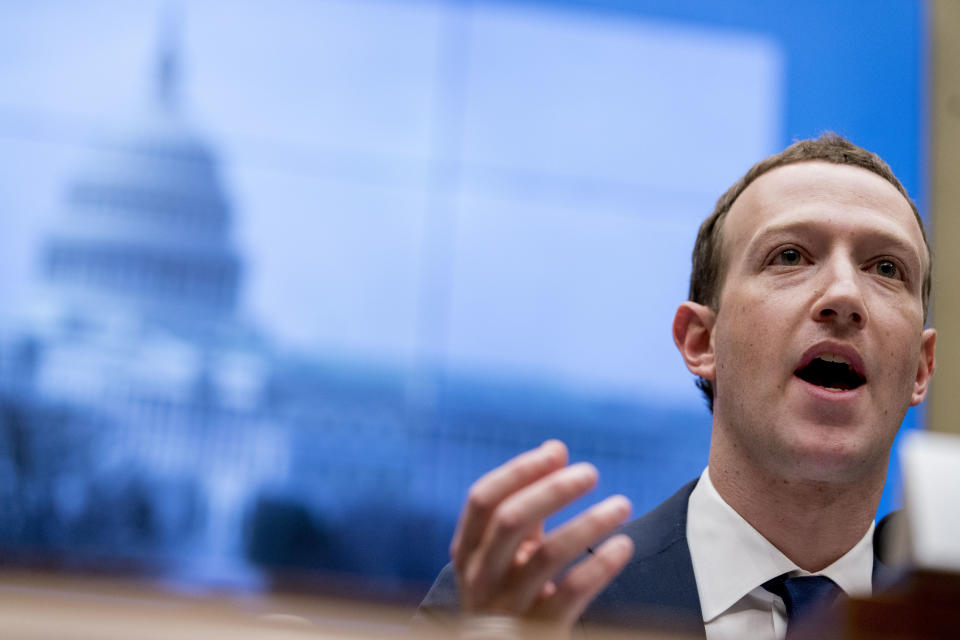
‘The industry is having a come-to-Jesus moment’
While Apple, Google, Facebook, and Amazon are the largest tech companies involved in the lobbying against data privacy bills, they are not the only businesses in the sector fighting the legislation. Verizon, AT&T, Comcast (CMCSA), T-Mobile (TMUS), and Match Group (MTCH) are among the companies that have lobbied against privacy bills this year.
Plus, many other tech companies belong to trade groups that have fought the data privacy bills. Those companies number in the hundreds but include Twitter (TWTR), Lyft (LYFT), Uber (UBER), Cisco (CSCO), Hewlett-Packard (HP) and PayPal (PYPL). Companies and trade groups from other industries, like health insurance and finance, also lobbied against the privacy bills. On the other hand, Microsoft advocated in support of privacy bills in multiple states.
To be sure, some state legislators pointed to reasons for the failure of privacy bills that had nothing to do with tech lobbying. Short legislative sessions, the complexity of the issue, and other bill priorities contributed to the outcomes, multiple legislators said. Plus, many legislators said they welcomed input from large tech companies as stakeholders in the bill.
Since last year, the tech giants Apple, Facebook, Amazon, and Google have reportedly been lobbying in Washington D.C. to push for a federal data privacy law. The companies have appeared to put their money behind the effort, though the issue is among a number on which they’ve lobbied. In the final two quarters of last year and the first two of this year, Google spent $16.6 million on federal lobbying; Amazon spent $15.2 million; Facebook spent $13.1 million; and Apple spent $6.6 million.
“The industry is having a come-to-Jesus moment,” said Chad Marlow, a senior advocacy and policy counsel at the ACLU. “It’s deciding now that we have real privacy laws on the state level, we can get something on the federal level that’s weak and can preempt those laws.”
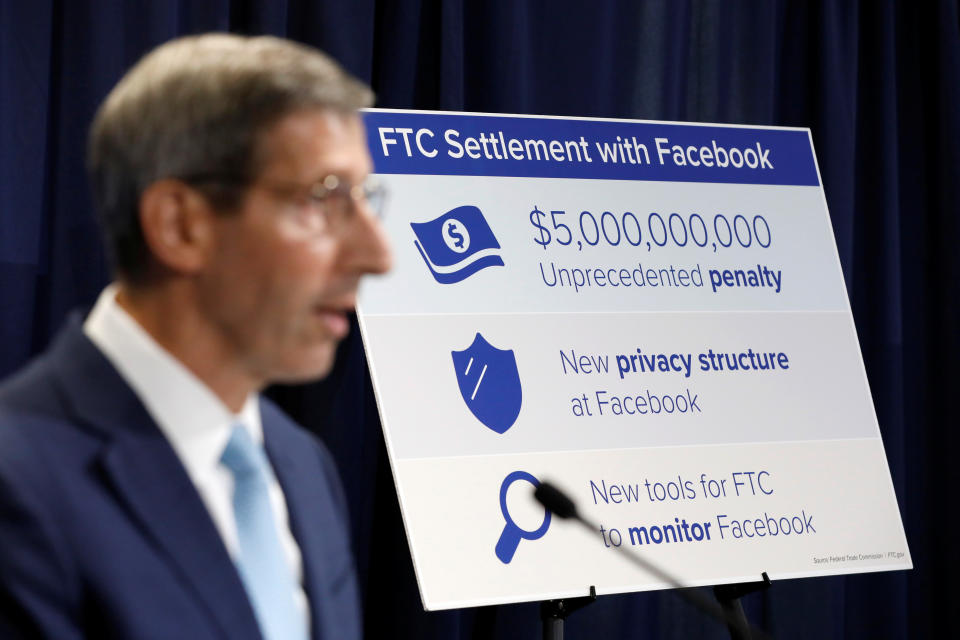
Ernesto Falcon, the senior legislative counsel at the Electronic Frontier Foundation, echoed the sentiment: “The purpose of federal legislation from the industry standpoint is to snuff out state laws,” he said.
The tech companies remain committed to a strong federal law, they said.
“We believe privacy is a fundamental human right and is at the core of what it means to be an American. To that end, we advocate for strong federal legislation that protects everyone regardless of which state they may live,” Apple said. A Google spokesperson said, “We supportive comprehensive baseline privacy legislation.”
State lawmakers, including Sen. Carlyle in Washington State, said they intend to reintroduce similar data privacy bills next session. “I’m completely committed to this bill,” Carlyle said. Rep. Kasper, in North Dakota, said, “More laws like this are coming.”
Marlow, of the ACLU, expressed disappointment in the failure of most data privacy bills this year but said he expects continued activity at the state level. “We realize there’s both a short and long game to this work,” he said. But he qualified: “I don’t necessarily think politics will tilt in our favor. I just think it’s tilting more in our favor.”
Falcon said he expects tech industry lobbying to continue to distort politics on the issue.
“Because of the resources they invest in the political process, it will be a tough fight,” he said. “Tougher than it needs to be.”
Calder McHugh contributed to this report.
Max Zahn is a reporter for Yahoo Finance. Find him on twitter @MaxZahn_.
Read more:
Walmart's political group has given millions to GOP lawmakers who oppose gun control measures
How black women could give Kamala Harris a financial boost in 2020
Amazon's HQ2 was a showdown between a union city and a tech giant
Read the latest financial and business news from Yahoo Finance
Follow Yahoo Finance on Twitter, Facebook, Instagram, Flipboard, SmartNews, LinkedIn,YouTube, and reddit.
